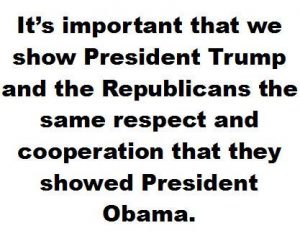Silence = Death while #love-trumps-hate
 In the aftermath of the 8 November 2016 presidential election, I saw a meme that proclaimed that “It’s important that we show President Trump and the Republications the same respect and cooperation that they showed President Obama.” I strongly disagree with this sentiment.
In the aftermath of the 8 November 2016 presidential election, I saw a meme that proclaimed that “It’s important that we show President Trump and the Republications the same respect and cooperation that they showed President Obama.” I strongly disagree with this sentiment.
The author of this meme rightly references the lack of respect and cooperation that the Republican led congress showed to President Barak Obama. However, as Michelle Obama so eloquently argued at the Democratic National Convention, “when someone is cruel or acts like a bully you don’t stoop to their level. No, our moto is: when they go low, we go high.”
I am one of the many people who believe that Senate Majority Leader Mitch McConnell and his Republican colleagues in the Senate abdicated their constitutional responsibilities when they did not hold hearings on Merrick Brian Garland’s nomination to the Supreme Court. Had the Democrats gained control of the Senate, I would be equally critical if the new Democratic Majority Leader refused to hold hearings on President Trump’s nominations. Inappropriate behavior is not justified because someone else behaved inappropriately first. However, to show respect to the President or to the President-elect does mean that we need to agree with them or even that we have to support their nominees after hearings are held.
In 1972, my grandmother took me and several of her other grandchildren to see the President of the United States, an office then held by Richard Nixon. Grandma hated Richard Nixon and made it clear that we were off to see the president; not the individual whom held the office. Although she hated Richard Nixon, she respected the Office of the President. I am a better person because I learned this important distinction from her.
I recently had a conversation with a colleague about someone whose actions I have been extremely critical of. During the conversation, my colleague reported that this individual had taken a very supportive role on an issue that both my colleague and I support. Because of the lesson I learned from my grandmother, I can be both critical of this individual while commending them on their support for this project.
Some might argue that I am being a hypocrite by treating someone respectfully whom I do not respect. In her Miss Manners’ Guide to Domestic Tranquility, Judith Martin argues that she “believes that the world could use a great deal more hypocrisy…Surely, people who actually do care about doing good in the world ought to recognize that there are instances in which the virtue of kindness ought to take precedence over the virtue of speaking one’s mind.”
In advocating for the type of hypocrisy advanced by Miss Manners, I am not saying that kindness mandates that we not speak our minds; just that we do so with metta or loving-kindness. Loving-kindness requires kindness; not silence. In fact, it could be argued that we cannot practice metta in silence. I can treat the individual I do not respect with respect while also filing a complaint against them to stop what I view as questionable actions on their part that harm students and faculty.
On the classroom level, we are rightly expected to demonstrate a Miss Manners inspired hypocrisy. As professors, it’s important that we not treat disrespectful or uncooperative students with the same disrespect and lack of cooperation that they show us. We are better than that. Yet, this does not mean that we should not ask disrespectful students to leave class is they cannot control their inappropriate behavior; especially when their inappropriateness is directed at other students.
In Violence and the Sacred, Rene Girard argues that violence is memetic. Those who advocate that Democrats should not be respectful or cooperative with President-elect Trump because Republicans were disrespectful and uncooperative with President Obama are essentially advancing the position that we must continue the cycle of violence that has poisoned American political discourse. This does not mean that we cannot vigorously voice our disapproval and fear of the President-elect and his policies. We just need to voice our disapproval and fear in the same respectful way that President Obama’s critics should have treated him; not in the way that too many of his critics actually treated him.
 I have no doubt that my grandmother would have hated Donald Trump even more than she hated Richard Nixon. I am equally confident that she would be a vocal advocate for her transgendered great granddaughter who fears what the future might hold for her. However, in 1972, Grandma would not have permitted any of her grandchildren to have been disrespectful to the President of the United States; a position she would still advance today.
I have no doubt that my grandmother would have hated Donald Trump even more than she hated Richard Nixon. I am equally confident that she would be a vocal advocate for her transgendered great granddaughter who fears what the future might hold for her. However, in 1972, Grandma would not have permitted any of her grandchildren to have been disrespectful to the President of the United States; a position she would still advance today.
In the words of a slogan recently resurrected from the 1980s: “Silence = Death.” People need not and should not be silent about actions that harm others. However, those of us who give voice to our real fears and concerns need to remember another important message advanced during the 2016 presidential campaign; that “Love trumps hate.”
- –Steven L. Berg, PhD
LEAVE A COMMENT